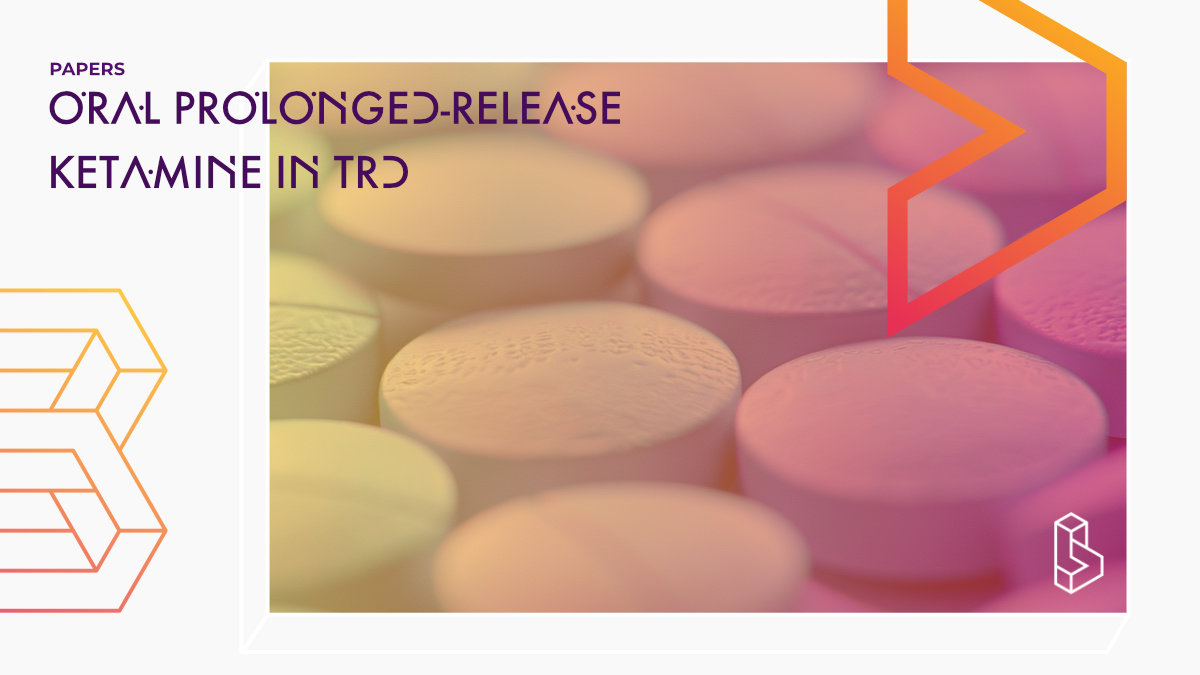This double-blind, randomized study (n=27) assessed the antidepressant effects of a novel oral prolonged-release formulation of racemic ketamine (KET01) in TRD patients as add-on therapy. Patients received either 160 mg/day or 240 mg/day KET01 or placebo for 14 days, with the primary endpoint being the change in Montgomery-Åsberg Depression Rating Scale (MADRS) scores from baseline to day 15. Results suggest a positive trend towards antidepressant efficacy with 240 mg/day KET01.
Abstract of Oral prolonged-release ketamine in treatment-resistant depression – A double-blind randomized placebo-controlled multicentre trial of KET01, a novel ketamine formulation – Clinical and safety results
“Introduction: We investigated the antidepressant effects of a novel oral prolonged-release formulation of racemic ketamine (KET01) in patients suffering from treatment-resistant depression (TRD) as add-on therapy.
Material and methods: Patients were randomized to an additional 160 mg/day or 240 mg/day KET01 or placebo for 14 days. The primary endpoint was change in Montgomery-Åsberg Depression Rating Scale (MADRS) scores from baseline to day 15. For treatment group comparisons, we used ANOVA with pairwise least squares mean difference tests in a mixed model repeated measures analysis.
Results: Twenty-seven patients completed the double-blind protocol before trial premature termination due to poor recruitment during the COVID-19 pandemic. Mean (SD) MADRS scores on day 15 were 23 (10.32) in placebo, 25 (8.28) with 160 mg/day and 17 (10.32) with 240 mg/day KET01. MADRS change was numerically larger but statistically non-significant in the 240 mg/day KET01 group vs placebo on day 7 (−5.67; p = 00.106) and day 15 was (difference: 4.99; p = 00.15). In exploratory analysis, baseline leukocyte count correlated with response to KET01 (p = 00.01).
Distribution of adverse event rates were comparable between the treatment arms. Safety analysis did not identify increased risk of suicidality, dissociation, hear rate, systolic and diastolic blood pressure associated with trial treatment.
Discussion: Our results suggest that adjunctive oral administration of prolonged-release ketamine at a dose of 240 mg/day shows a positive, although statistically non-significant, trend towards antidepressant efficacy, however, the benefit could not be confirmed due to premature trial termination. Given its ease of use and low side effects, further trials are warranted to investigate this route of ketamine administration as a promising potential treatment of TRD.”
Authors: M. Colla, B. Offenhammer, H. Scheerer, G. Kronenberg, S. Vetter, J. Mutschler, T. Mikoteit, A. Bankwitz, A. Adank, L. Schaekel, C. Eicher, A.B. Brühl & E. Seifritz
Summary of Oral prolonged-release ketamine in treatment-resistant depression – A double-blind randomized placebo-controlled multicentre trial of KET01, a novel ketamine formulation – Clinical and safety results
Approximately 20-30% of patients with major depressive disorder do not respond adequately to several cycles of antidepressant treatment. These patients are characterized by increased mortality and poorer health-related quality of life compared to non-TRD patients.
To date, there are only a limited number of treatment options available for TRD, and ketamine has emerged as a new and effective treatment in this patient population. Ketamine is usually administered as intravenous infusion either as monotherapy or in combination with pre-existing psychiatric medication.
Nasal and intravenous routes of administration both have their advantages and disadvantages. Esketamine nasal spray may be administered only under the supervision of a healthcare provider, and ketamine infusions must be closely monitored in a clinical setting.
Find this paper
https://doi.org/10.1016/j.jpsychires.2024.03.002
Paywall | Google Scholar | Backup | 🕊
Cite this paper (APA)
Colla, M., Offenhammer, B., Scheerer, H., Kronenberg, G., Vetter, S., Mutschler, J., ... & Seifritz, E. (2024). Oral prolonged-release ketamine in treatment-resistant depression-A double-blind randomized placebo-controlled multicentre trial of KET01, a novel ketamine formulation–Clinical and safety results. Journal of Psychiatric Research.
Study details
Compounds studied
Placebo
Ketamine
Topics studied
Treatment-Resistant Depression
Depression
Study characteristics
Placebo-Controlled
Double-Blind
Randomized
Participants
27
Humans

